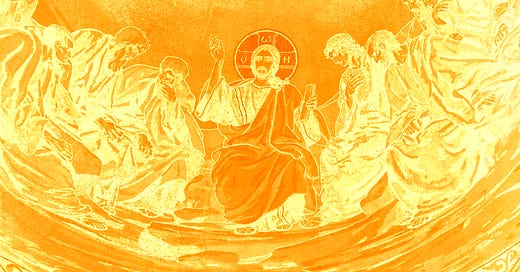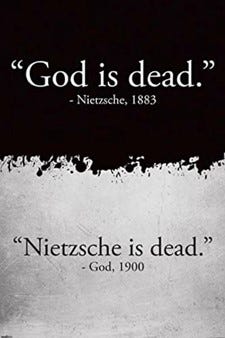“Not everyone who says to me, ‘Lord, Lord,’ will enter the kingdom of heaven, but only the one who does the will of my Father who is in heaven. Many will say to me on that day, ‘Lord, Lord, did we not prophesy in your name and in your name drive out demons and in your name perform many miracles?’ Then I will tell them plainly, ‘I never knew you. Away from me…’”
Describe the God you don’t believe in - is something I ask my students to do at the start of our topic on the existence of God. Everyone can play – and everyone slightly struggles, as we all sort-of believe that the idea of ‘God’ which we have in our minds is what we mean when we use the word ‘God’. More often than not, after everyone has described the God they don’t believe in, I confess that despite being a theist myself, I don’t believe in the Gods they have renounced either. And this annoys everyone, especially the Fundamentalist Atheists.
Now, I’m not here to have a go at atheists - I’m actually here to celebrate them – encourage such a way of being in the world. There's no going back for me - but save yourself – stay an atheist, if you can! Not because its true – that’s obvious – and you don’t need me to point that out. But rather, because you really don’t need to believe in God. In fact, belief in God might get in the way of participating in God’s will for your life. Indeed, in my experience, my belief in God has been the biggest barrier to communing with God. It has been my biggest sin, which is to say, method of separating, splitting, and severing from the divine dance of being - because, in order to believe in God, you have to separate yourself from ‘It/Them/Him/Her’. Belief has a cunning way of shunning God from our lives to the upper echelons of celestial symbols, signs, and ideas.
Belief also becomes a surrogate for salvation. With belief, I think there is a danger of conflating concepts, creedal-claims, and clever-ish intellectual somersaults...with genuine conversion – which is not really about saying the right words, or following the correct commandments, but more a childlike playful participation in the incarnational creation we are already in and could call ‘God’. Religion, at best, is a way of helping people return, re-align, re-ligament, and re-vert back to where we started. Religion is a crutch – for people like me, who need help remembering who they were before they split their mind and body, soul and heart, light and dark, clean and dirty, spiritual and material, heaven and earth...into smithereens!
And perhaps some atheists are spared such a deadly sin against the spirit (which is the only sin that can’t be forgiven) – they know that the point of life is life – they participate in love, joy, peace, justice, beauty, and truth because they are at home in their minds, bodies, and souls. They have faith in their God-given divine image because they are blind to it.
Although, be warned – there are dangers with atheism too. But don’t take it from me – a desperate theist in need of a crutch or two – but rather from one of your best: Friedrich Nietzsche - who always brings to mind a conversation I had with a librarian who loved to use posters in her library as a way of evangelising her favourite expression of Christianity. Here is one of her favourites:
I politely pointed out that the poster completely misrepresented Nietzsche’s observation, as it wrongly assumes that Nietzsche was in some way making a triumphant meta-physical declaration of atheism. He wasn’t. He was actually pointing out something deeply spiritual, psychological, and sociological. And certainly not celebratory.
Nietzsche announces the death of God in a famous aphorism in his book The Gay Science, called The Madman. In this passage he tells a tale of a madman who runs out onto the street screaming, “I seek God! I seek God!” Understandably, those on the street give him a strange look and continue on with their evening. But the madman does not cease. No indeed. He yells:
‘God is dead! God remains dead! And we have killed him! How shall we console ourselves, the most murderous of all murderers…’
Nietzsche understood that the death of God could potentially catapult a large majority of the human race into a state of nihilism - that is to say, a state of meaninglessness. In this way, I think Nietzsche was a Prophet. A crisis of meaning does seem to pervade our schools, workplaces, and enterprises. For Nietzsche, the decline of religion and the death of God left humanity swimming in a void-like abyss, with no myths, symbols and rituals to contain, support, and inspire us. We replaced meaning with materialism. We replaced God with Science. And with it, a despairing sense of ‘what’s the point?’
Of course, Nietzsche was highly critical of institutional religion, and Christianity in particular. He didn’t think the way forwards was the way back. But in one of his earlier works, Human, all too Human, Nietzsche expressed the tragic, nihilistic agony that follows such a death:
‘But the tragic thing is that we can no longer believe those dogmas of religion and metaphysics, once we have the rigorous method of truth in our hearts and heads, and yet on the other hand, the development of mankind has made us so delicate, sensitive, and ailing that we need the most potent kind of cures and comforts—hence arises the danger that man might bleed to death from the truth he has recognised. Byron expressed this in his immortal lines: Sorrow is knowledge: they who know the most must mourn the deepest o’er the fatal truth, the tree of knowledge is not that of life.’
Clearly Nietzsche isn’t very optimistic about the pursuit of scientific truth as the answer: ‘Man might bleed to death from truth he has recognised.’
Science is great. Studying the material world is important. But science cannot help us with meaning. Science cannot tell us how to live. Science cannot show us what is morally right. ‘Happiness is the meaning of life’, ‘Discrimination is wrong’, ‘Beauty is good’, ‘Love is the answer’… are not empirically verifiable or falsifiable hypotheses. They cannot be proved right or wrong in a laboratory or field study. Science might give us some important data to guide our decisions – but ultimately we are left with a question of meaning. And science cannot tell us why we are here. It can only explain how we got here, and how things work.
For Nietzsche the death of God marked the end of an age. And the reality is, we don’t live in an age of collective mythology and meta-narratives. There is not one large story and language that holds us all together. I’m not entirely sure we can go back to such a society. ‘God is dead! God remains dead! And we have killed him! How shall we console ourselves, the most murderous of all murderers…’. The temptation of course is to live in denial. To not grieve the loss of meaning. To regress back to things that seemed to work in the past. To miss out on the ‘new dawn’. Indeed, Nietzsche reached the opinion that the loss of faith in collective religion was an opportunity. In his book, The Gay Science, he wrote:
“In fact, we philosophers and “free spirits” feel as if we are illumined by a new dawn, on receiving the news that “the old God is dead”; our hearts overflow with gratitude, wonder, premonition, anticipation. At last the horizon seems to us open again…the sea, our sea again lies open before us; perhaps there has never yet been such an “open sea.”
God is not dead, but Gods do die. And one day, even our precious God of Consumerism will die. In such apocalyptic times, a chaotic crisis of meaning always ensues - but with it the possibility of resurrection, rebirth, and renewal. And tempting as it is to project this ‘new dawn’ into the skies, and onto an All-This All-That Super Being, I believe our true vocation is to know who we are, where we are, on earth as it is in heaven – which is to know, as Christ reminds us in The Gospel of John, quoting the Psalms: ‘you are the gods’. Perhaps Nietzsche wasn’t such an Antichrist after all, just not a ‘Lord, Lord’ type of guy. He showed up, which might well mean that Christ would not have said: ‘I never knew you.’
So maybe it’s not a case of
Who you know
Or
Who you healed
But rather
Were you here!
Where the kingdom is
‘To be, or not to be?’ really is the question
So be it [Amen]






